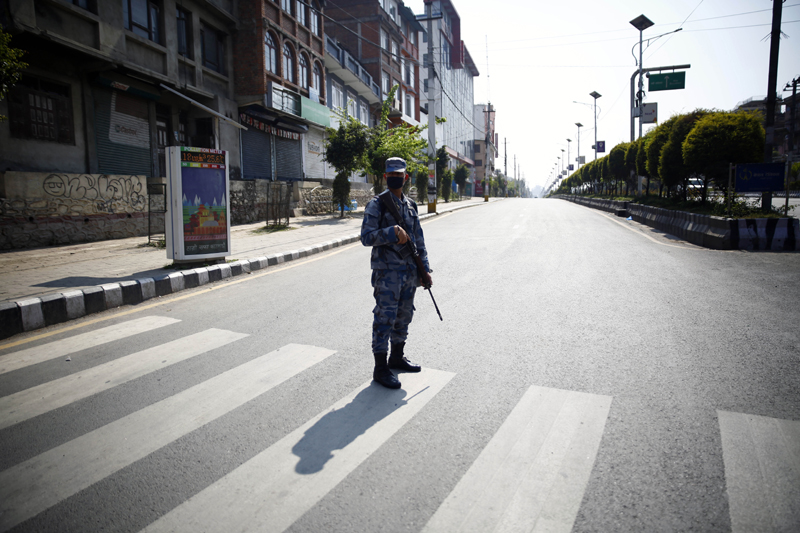Second phase of ‘heterogeneous’ stimulus package should aim at upscaling the economy
Kathmandu, April 8
Experts have suggested the government to bring in stimulus package which is ‘heterogeneous’ in nature, boosts the morale of businesses and helps revive the economy from the ongoing turbulence triggered by the COVID-19 or coronavirus pandemic.
Though the government last week announced a relief package targeting those affected by the coronavirus and the government’s move to put the country under lockdown, the measures will only provide some immediate relief and the government should bring out a mega package covering all sectors affected by the coronavirus pandemic and focused on reviving businesses and the economy, they said.
Shankar Sharma, former vice-chairman of National Planning Commission (NPC), opined that the recent relief package of the government seemed inadequate and failed to ensure confidence among businesses.
In such a context, the government should immediately plan and unveil the second phase of relief package to give hope to the sectors worst-hit by the coronavirus.
Firstly, the government should take care of the informal sector workers who have been most affected. “For workers in the informal sector, the government should first ensure enough availability of food stuffs till the lockdown is in place. After that, such workers should be ensured jobs. The Prime Minister Employment Programme (PMEP) can be best utilised in the present context to generate jobs for those working in the informal sector,” opined Sharma.
More than half of the economically active population in Nepal is believed to be involved in the informal economy, which is still expanding rapidly. Workers in the informal economy face multiple challenges, especially as they are beyond the regulation of the government. Consequently, such workers are subject to suffer the most and be deprived of many fundamental rights in crises situations.
In the formal sector, the government should further extend the time for businesses and individuals to clear taxes, bank loans and interests, which have currently been deferred to mid-July, as per Sharma. “Along with big businesses, small and medium enterprises (SMEs) are reeling under the current crisis.
As SMEs are the real driving force of the economy, the government should not overlook them,” said Sharma.
Experts have also suggested the government, especially the central bank, to raise the size of refinancing fund to around Rs 50 billion from existing Rs 10 billion and use different banking instruments to bring down the interest rate on loans. Other measures that the second phase of relief package of the government should encompass include waiving customs tax on import of raw materials for industries hit by the coronavirus for a certain period, contributing certain amount to the provident fund of workers for a few months, among others.
“While such immediate measures should be announced through a stimulus package, other long-term measures to revive the economy from the coronavirus should be introduced through the upcoming budget for 2020- 21 fiscal year,” added Sharma.
Meanwhile, economist Biswo Poudel said the second phase of the relief package of the government should be heterogeneous in nature targeting to revive and uplift the entire economy.
“Along with big businesses, the virus has hit the self-employed and rendered them jobless. The government should urgently focus on executing mega projects such as the Budhigandaki hydel project that can create jobs at a mass scale,” said Poudel.
If possible, the government should also give tax waivers for the tourism industry, shopping malls and other entertainment centres whose businesses are dependent on mass consumers/customers, as per him. “The government is also likely to face shortage of resources. Hence, it should adopt austerity measures in budget expenditure and cut down on unnecessary programmes, including allowances to the government staffers which are absorbing a huge chunk of the budget.”
Citing that the countrywide lockdown of the government was not properly planned and has severely affected the supply-demand cycle in the market, Poudel said that the SMEs across the country should be taken care of properly and special packages should be launched for them. “SMEs play a crucial role in uplifting the economy,” he said.
The private sector too has been saying that the recent relief package is inadequate and urging the government to introduce more comprehensive packages for businesses affected by the COVID-19 pandemic.
“The government should introduce short-term and longterm relief packages for businesses and the public, as it will likely take months for businesses to recoup their losses,” said Satish Kumar More, president of the Confederation of Nepalese Industries (CNI).
Though the government is still undecided over the second phase of the relief package for the coronavirus-hit populace, businesses and the economy, the newly-appointed Governor of the central bank Maha Prasad Adhikari has hinted that the Nepal Rastra Bank (NRB) will introduce additional relief packages soon.
Moreover, NRB has formed a technical committee to study the impact of the coronavirus on businesses and the economy.
The central bank is expected to launch additional stimulus packages based on the findings and recommendations of the study committee.
A version of this article appears in e-paper on April 09, 2020 of The Himalayan Times.






